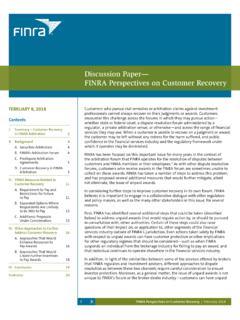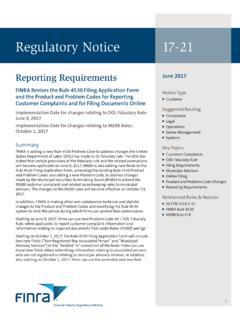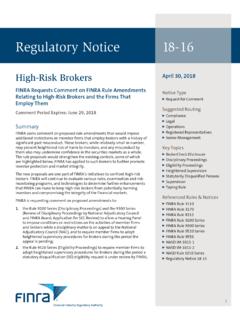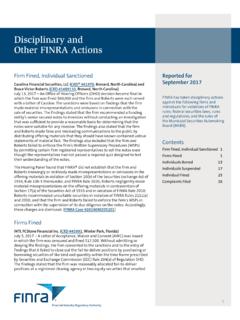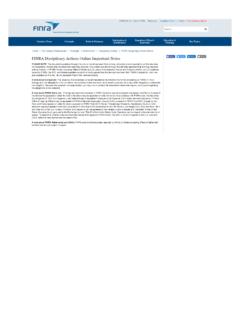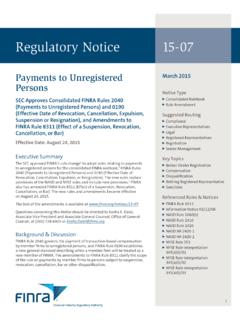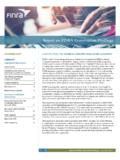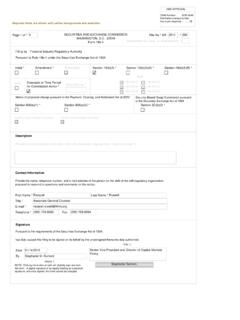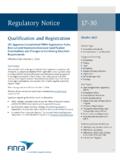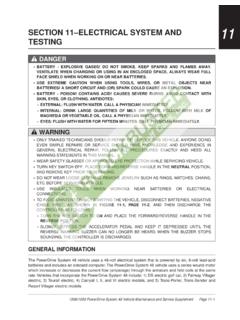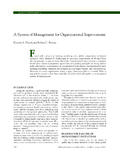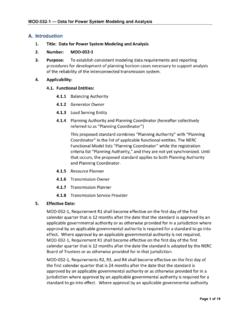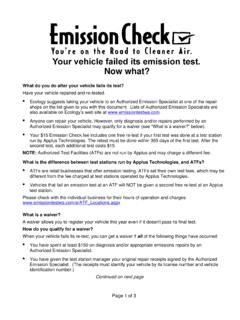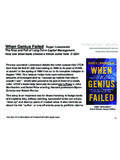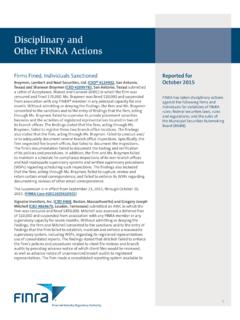Transcription of Firm Expelled, Individuals Sanctioned Reported for January ...
1 1 Disciplinary and Other FINRA ActionsFirm Expelled, Individuals SanctionedSuccess Trade Securities, Inc. (CRD #46027, Washington, DC) and Fuad Ahmed (CRD #2404244, Washington, DC)November 27, 2017 A Securities and Exchange Commission (SEC) decision became final in which the firm was expelled from FINRA membership and Ahmed was barred from association with any FINRA member in any capacity. The firm and Ahmed also were ordered to pay, jointly and severally, $13,684, , plus prejudgment interest, in restitution to investors. The SEC sustained the sanctions following an appeal of a National Adjudicatory Council (NAC) decision. The sanctions were based on findings that the firm and Ahmed willfully violated Section 10(b) of the Securities Exchange Act of 1934, Securities Exchange Act of 1934 Rule 10b-5, and FINRA Rules 2020 and 2010 by making misrepresentations and omissions of material fact when they sold $ million of their parent company s promissory notes to investors.
2 The findings also stated that the firm and Ahmed violated FINRA Rule 2010 because they sold the parent company s unregistered and nonexempt promissory notes in contravention of Section 5 of the Securities Act of 1933. (FINRA Case #2012034211301)Firms FinedBrickell Global Markets, Inc. (CRD #104316, Miami, Florida)November 1, 2017 A Letter of Acceptance, Waiver and Consent (AWC) was issued in which the firm was censured and fined $15,000. Without admitting or denying the findings, the firm consented to the sanctions and to the entry of findings that it conducted a securities business while failing to maintain its required minimum net capital. The findings stated that the deficiencies occurred after the firm improperly treated a $ million insurance receivable, related to its settlement of a customer lawsuit, as an allowable asset for the purpose of calculating its net capital.
3 The findings also stated that due to its erroneous net capital computation, the firm filed inaccurate Financial and Operational Combined Uniform Single (FOCUS) Reports and maintained an inaccurate general ledger. (FINRA Case #2016050832201)FINRA has taken disciplinary actions against the following firms and Individuals for violations of FINRA rules; federal securities laws, rules and regulations; and the rules of the Municipal Securities Rulemaking Board (MSRB). Reported for January 20182 Disciplinary and Other FINRA Actions lO2lp s43 Goldman Sachs & Co. LLC (CRD #361, New York, New York)November 1, 2017 An AWC was issued in which the firm was censured and fined $39,500. Without admitting or denying the findings, the firm consented to the sanctions and to the entry of findings that it failed to transmit last sale reports of transactions in over-the-counter (OTC) equity securities to the OTC Reporting Facility (ORF ) within 10 seconds after execution.
4 The findings stated that the firm failed to report the correct execution time for transactions in reportable securities to the ORF. The findings also stated that the firm s supervisory system did not provide for supervision reasonably designed to achieve compliance with respect to the applicable securities laws and regulations, and NASD and FINRA rules, concerning OTC equity trade reporting. (FINRA Case #2015045105501)Scottrade, Inc. (CRD #8206, St. Louis, Missouri)November 1, 2017 An AWC was issued in which the firm was censured and fined $42,500. Without admitting or denying the findings, the firm consented to the sanctions and to the entry of findings that it transmitted orders to the Order Audit Trail System (OATS ) that contained inaccurate, incomplete, or improperly formatted data.
5 The findings stated that the firm failed to provide details required to be disclosed on confirmations to customers for transactions effected by a broker-dealer. The findings also stated that the firm s supervisory system, including WSPs, were not reasonably designed to achieve compliance with respect to the applicable securities laws and regulations and to FINRA rules. The findings also included that the firm s WSPs failed to provide for one or more of the requirements for adequate WSPs related to OATS reporting requirements and accuracy of customer confirmations for trades being Reported by a third party on the firm s behalf. FINRA found that the firm s WSPs did not provide for procedures and supervision reasonably designed to ensure and review for compliance with the requirements to locate (or arrange to borrow) securities being sold prior to execution as prescribed by SEC Rule 203(b) of Regulation SHO.
6 (FINRA Case #2016048608401)David Lerner Associates, Inc. (CRD #5397, Syosset, New York)November 2, 2017 An AWC was issued in which the firm was censured and fined $75,000. Without admitting or denying the findings, the firm consented to the sanctions and to the entry of findings that it failed to timely file Uniform Application for Securities Industry Registration or Transfer (Form U4) and Uniform Termination Notice for Securities Industry Registration (Form U5) amendments with FINRA. The findings stated that FINRA informed the firm of its filing deficiencies, as part of FINRA s cycle examination of the firm, but the firm continued to submit Form U4 and Form U5 amendments in an untimely manner. Additionally, the firm failed to file Form U4 amendments to disclose four written customer complaints alleging sales practice violations and failed to file timely initial Forms U5 to report that it had terminated the registration of 14 representatives.
7 The findings also stated that the firm failed to report two securities-related arbitrations brought by customers that resulted in settlements in amounts exceeding $25,000 and failed to timely report statistical and summary information regarding 17 written customer complaints. The findings also Disciplinary and Other FINRA Actions 3 lO2lp s43 included that the firm failed to establish and maintain supervisory procedures reasonably designed to achieve compliance with its obligation to report information to FINRA on Forms U4 and U5. The firm s WSPs generally required it to timely submit regulatory filings, including Form U4 and U5 amendments and filings, pursuant to FINRA Rule 4530. However, the firm did not adopt any specific written procedures for the collection and submission of information required on the Form U4 or Form U5.
8 Further, the firm lacked procedures for supervising the timely submission of Form U4 and Form U5 amendments regarding customer arbitrations against the firm or its registered representatives. The firm also lacked procedures for supervising the timely reporting of statistical and summary information regarding written customer complaints to FINRA. Consequently, the firm repeatedly failed to submit its regulatory filings in a timely manner. FINRA found that the firm failed to establish and maintain supervisory procedures reasonably designed to achieve compliance with Regulation T. In addition, prior to approximately 2014, the firm lacked any written procedures for filing and supervising extension requests under Regulation T. After adopting written procedures regarding Regulation T, the firm failed to take adequate steps to ensure that its employees, including those responsible for filing Regulation T extension requests, reviewed and understood the procedures.
9 The firm s procedures for conducting supervisory reviews for compliance with Regulation T were also deficient and as a result, the firm did not detect erroneous information entered on extension requests, including errors that resulted in a customer exceeding the annual limit of extension requests. In addition, the firm failed to establish and maintain procedures for imposing a 90-day freeze on extensions of credit to customers who sold securities without having paid for them as required under subpart (c) of Regulation T. (FINRA Case #2015046295201)Questar Capital Corporation (CRD #43100, Minneapolis, Minnesota)November 2, 2017 An AWC was issued in which the firm was censured and required to provide FINRA with a remediation plan to remediate eligible customers who qualified for, but did not receive, the applicable mutual fund sales-charge waiver.
10 As part of this settlement, the firm agrees to pay restitution to eligible customers, which is estimated to total $796,892 (the amount eligible customers were overcharged, including interest). Without admitting or denying the findings, the firm consented to the sanctions and to the entry of findings that it disadvantaged certain retirement plan and charitable organization customers that were eligible to purchase Class A shares in certain mutual funds without a front-end sales charge. The findings stated that these eligible customers were instead sold Class A shares with a front-end sales charge, or Class B or C shares with back-end sales charges, and higher ongoing fees and expenses. These sales disadvantaged eligible customers by causing such customers to pay higher fees than they were actually required to pay.
